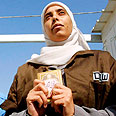

Muna was the mastermind behind the murder of teenager Ofir Rahum while Tamimi drove the Sbarro restaurant suicide bomber to his Jerusalem destination, where he murdered 15 Israelis and seriously injured many others.
In Israel, the release of the two is stirring strong emotions as they symbolize in their non-apologetic demeanor a strong sense of disgust and well-founded desire that they serve the rest of their lives in prison for their murderous activity. According to the prisoner swap deal, both will be deported: Muna to Gaza and Tamimi to Jordan.
- For extensive coverage of the Shalit deal, click here
As part of a project I conducted in Israeli prisons, I have held lengthy conversations with the two. Apart from being a young and intelligent woman, Muna turned out to be a manipulative woman with a larger ego than the entire Palestinian problem she claims to represent.
During our meetings, her mood swings could be easily identifiable. Alongside her outrageous statements defending her right to murder her enemies, including an innocent teenager who was lured by her romantic gestures, she still tried to convince me that she was not the monster that Israelis claim her to be.
Muna's problem is that it isn’t only Israelis who view her as a monster. Her fellow inmates also think she is. She controlled the prisoners in her ward with an iron fist as if she were Al Capone. Several inmates who refused to obey her orders suffered heavy punishments. Some were bitten by her while others suffered serious burns inflicted by boiling wax because they dared challenge her leadership.
Her infamous cruelty did not go unnoticed. Many Fatah members including her accomplice found it hard to defend her actions to me. Hamas even vowed to "sort things out" with her upon her release.
Even if it is no comfort to the Rahum family and the people of Israel, Muna may initially be received as a hero in Hamas-controlled Gaza, but her fate may not turn out to be as bright. She obviously won't enjoy much comfort in light of her abusive methods in prison.
Chilling composure
Ahlam Tamimi was always proud of the fact that she was the first female Hamas combatant. She planted an explosive charge she had made inside a bottle and placed it on a supermarket shelf. Since she had a press card, she was granted free access to roam Jerusalem and collected information on possible targets for Hamas.She personally led the suicide bomber to the location that she had singled out – the Sbarro restaurant – because she said there were "many radical Jews there".
She spoke to me while maintaining a chilling and provoking composure, which characterizes her entire attitude. The only concern she expressed in our meetings, during which she defiantly described her story, pertained to a possible deportation to Jordan, as was eventually decided upon in this deal.
During her prison sentence, Tamimi got engaged to her cousin – who is also jailed in Israel – and may now remain single. In contrast to Mona, she is expected to join Hamas' propaganda machine because of her persuasive rhetoric ability. She may even turn into Hamas' Leila Khaled (a Fatah plane hijacker who became a leading voice of the Palestinian cause).
Mona, Tamimi, and Kahira al-Saadi – another female prisoner and mother of four who was sentenced to life in prison for her role in suicide bombings – are viewed as heroes in the Arab press.
However, they may carry the burden of other women who were tainted while serving time in prison, as is common in the traditional societies they come from and to which they will return. It is also likely that they will learn just how wide the gap is between their heroic public image and the daily reality of their lives.
Perhaps we can find some solace in the fact that the damage their release will cause will be limited to the symbolic-emotional sphere while the security risk they will possess after being released will be miniscule to non-existent.
The writer is head of a terrorism project at the Institute of National Security Studies and interviewed dozens of security prisoners held in Israel over the years.
- Follow Ynetnews on Facebook















